On Thursday, November 20, 2014, at the Bornstein Amphitheater at Brigham and Women’s Hospital, CLBB and the Boston Society for Neurology and Psychiatry co-sponsored a talk by Steven Pinker, renowned Harvard cognitive psychologist, linguist, and popular author, to discuss his most recent book, The Sense of Style: The Thinking Person’s Guide to Writing in the 21st Century. Video of the event is included below in its entirety and at our Vimeo page. Continue reading »
Video: Steven Pinker: “The Thinking Person’s Guide to Writing in the 21st Century”
- Category: Events
- Tags: bsnp | Steven Pinker | writing
- Date: November 21, 2014
- Author: admin2
Watch: “Free Will: What Can Physiology Explain?”
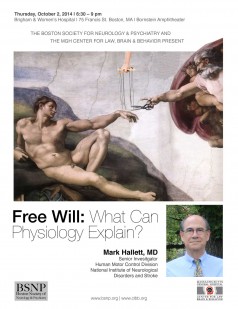
While we may believe that we choose and direct our movements consciously, the physiology of human motor control provides compelling evidence that this sense of conscious decision – free will – is a perception only.
On Thursday, October 2, 2014, at the Bornstein Amphitheater at Brigham and Women’s Hospital, CLBB and the Boston Society for Neurology and Psychiatry co-sponsored an event exploring how an understanding of human motor control can contribute to the question of free will. Video of the event is included below in its entirety and at our Vimeo page. Continue reading »
- Category: Events
- Tags: bsnp | criminal-responsibility | mark hallett
- Date: October 6, 2014
- Author: admin2
Dispatch: “Neuro-interventions and the Law” Conference
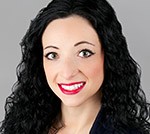
Dr. Ekaterina Pivovarova
On September 12-14, 2014, the Atlanta Neuroethics Consortium was held at Georgia State University. The topic, Neuro-Interventions and the Law: Regulating Human Mental Capacity, brought together leading scholars on philosophy, neuroscience, law, cognitive and clinical psychology, psychiatry, and bioethics. The participants included Judge Andre Davis, Nita Farahany, Stephen Morse, Francis Shen, Walter Sinnot-Armstrong, Nicole Vincent, and Paul Root Wolpe. The conference panels, talks, and keynotes addressed pressing issues about managing and appropriately utilizing novel neuroscientific technologies as they relate to legal issues. Continue reading »
- Category: Events
- Tags: andre davis | criminal-responsibility | ekaterina pivovarova | neuroethics | nita farahany | stephen morse | tDCS
- Date: September 30, 2014
- Author: Ekaterina Pivovarova
Mass. forward-thinking on raising age for juvenile offenders
By Dr. Robert Kinscherff, July 19, 2024, 2:30 a.m.
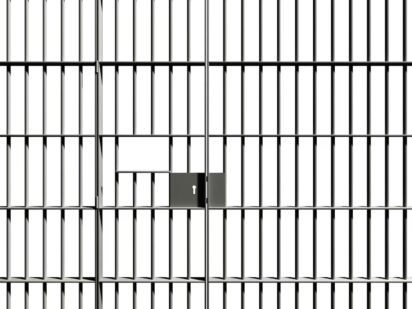
Young adults similar to adolescents, especially in emotionally charged situations
Thank you to Adrian Walker for his column on raising the age for juvenile offenders. I commend Senate President Karen Spilka and Senator Brendan Crighton for their roles in passing an amendment allowing 18-year-olds to be tried as juveniles for most offenses. This legislative decision is aligned with science and forward-thinking people familiar with the issues.
In January, the Supreme Judicial Court decided Commonwealth v. Mattis, banning life without possibility of parole for any crimes committed by individuals ages 18 to 20. The court’s decision and the state’s proposed “Raise the Age” legislation are consistent with the research summarized in a “White Paper on the Science of Late Adolescence, A Guide for Judges, Attorneys, and Policy Makers,” authored by the Center for Law, Brain, and Behavior at Massachusetts General Hospital. This report, which focused on brain development through late adolescence, demonstrates that adolescents and young adults are similar — especially in emotionally charged situations — in acting impulsively, taking risks, seeking immediate rewards, and yielding to peer influence.
Clearly, laws should not be based on outdated information. Hopefully, the Legislature will continue to follow the science in considering criminal justice policy.
Read Dr. Robert Kinscherff’s full Letter to the Editor here.
- Category: News, Uncategorized
- Date: July 23, 2024
- Author: The Center for Law, Brain & Behavior
How Monogram Is Using AI to Help Empower Incarcerated Youth
Digital agency Monogram teamed up with neuroscience researchers on a tool to reduce the number of incarcerated adolescents
By Chloe Aiello, Reporter, Inc., June 14, 2024
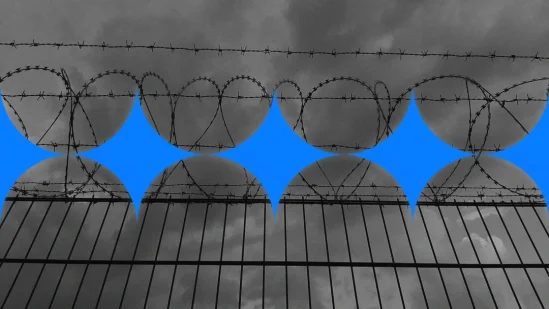
There’s a new tool in the fight for juvenile justice: an artificial intelligence-powered library.
Attorneys, judges, and even individuals who are incarcerated can now access the latest neuroscience and social science research at their own reading comprehension level, with the help of design engineering agency Monogram (No. 589 on 2023’s Inc. 5000 list). The Alpharetta, Georgia-based startup teamed up with the Center for Law, Brain & Behavior (CLBB) NeuroLaw Library at Massachusetts General Hospital, which is a Harvard Medical School teaching hospital, to create an AI-powered digital library. The resource is intended to democratize information on adolescent brains and behavior in hopes that it will be a valuable resource for people caught up in, or working in, the juvenile justice system.
“We’re using AI to help Harvard get this information out to as many people as possible,” Monogram co-founder and managing director DJ Patel says. “And if we can get even one person out of jail that doesn’t need to be in jail, we’ve won.”
Users who access the free online library will find articles from academic journals, amicus briefs, affidavits, court cases, as well as educational videos and toolkits all related to juvenile justice. The information is available to anyone, but specifically intended for people who are incarcerated, their legal representation, prosecutors, and other stakeholders in the juvenile justice system. That also includes judges, probation officers, and policymakers.
Google’s generative AI, Gemini 1.5 Pro, came into play by generating accessible translations of research and legal documents. Users who open a document will see a slider on one side of their screen. Moving the slider to the left adjusts the reading comprehension level in five intervals, with the rightmost option being the paper’s original text and the leftmost a summary at roughly a 6th-grade comprehension level.
Patel imagines a child in jail using the library. Although that person may not understand the original text of a document, Monogram’s slider “can take that document and translate it into whatever you’re capable of understanding,” Patel says.
Monogram is a design engineering agency that partners with companies like Vercel, Algolia, Stripe, and Contentful to design cutting edge websites and branding for clients like GitHub, BigCommerce, Google’s Angular, grocery store chain Hy-Vee, and others. Monogram came to work with Stephanie Tabashneck, the founding director of the CLBB NeuroLaw Library, through a referral from a friend of Tabashneck’s who had worked with Monogram. The company was then selected as a vendor to respond to a request for proposal.
The prompt seemed like a simple one: build a digital library to make the neuroscience research at CLBB widely available. The intention was to “level the playing field, especially for children and late adolescents who were facing serious charges,” says Tabashneck, who is also a forensic psychologist and attorney. The idea originally came from CLBB co-founder Dr. Judith Edersheim, who asked if Tabashneck would direct the library about a year and a half ago.
“At that time we had no idea what it meant to create a digital library so a lot of this was building the plane while it was flying with half the parts missing or falling off,” Tabashneck says.
Tabashneck says the primary audience for the NeuroLibrary’s research is people working in the legal system or people who are incarcerated, and that it is “not uncommon for defendants to be educating their attorneys,” as people can become “remarkably educated” about the legal system during a long incarceration. The resource is meant to help people understand their legal options, as well as to make sense of their own brain functioning, particularly if they committed a horrific crime when they were younger. Tabashneck also emphasized that while people who are incarcerated may enter the system as juveniles, they may only be eligible for parole when they are adults, so a wide range of age groups would likely use the resource.
Of course, a document being available doesn’t necessarily mean that it’s accessible. Much of the research that could fundamentally change someone’s sentencing-and life-can be found in dense academic texts, kept effectively out of reach due to the time, education level, or technology required to use it. Tabashneck says the team always wanted to include educational training and supplemental information to make the information more accessible, but it was Monogram that dreamed up the idea to use AI.
“It actually was an ‘aha moment’ that happened during the creative discovery process,” says TJ Kohli, Monogram co-founder and creative director. “Libraries don’t provide context. They provide the content, the data that you’re looking for. In this case, we were able to build a really good library and provide context in addition to that with AI.”
Tabashneck says AI was a “real game changer” for accessibility, given there are roughly 500 different articles in the database. “If you’re including each iteration of reading level, that’s 2,500 different writing products,” she says.
That doesn’t mean people weren’t involved. Generative AI has a reputation for hallucinations, or generating false or misleading information. To solve that problem, the CLBB team tasked research assistants with reading over every AI-mediated translation of every research paper to ensure that there were no inconsistencies.
Tabashneck adds that it wasn’t as simple as prompting the AI to generate grade-level versions of the text because “the translation will make it sound like you’re talking to a kid, and say things like, ‘Isn’t it cool that your brain does this,” which she says may come across as “patronizing.” Kohli adds that labeling on the slider and its various reading levels was left intentionally abstract so as not to “alienate” readers. Beyond that, they also used AI to generate a short summary of a text that gives readers an immediate sense of what they are reading.
Compared to other work from Monogram, CLBB’s website is pared back and utilitarian, or as Kohli says, “fast, efficient, intuitive” and designed to make every click count. The website, for example, starts loading a page the instant a user hovers over a link.
“If you’re in a correctional facility, and you have 10 minutes to be on a computer, lag time matters,” Tabashneck says. “These are things that we did for accessibility, but contributed to a stronger website overall.”
The NeuroLaw Library is a cutting edge resource to address the ongoing problem of youth incarceration in the U.S. The U.S. leads the industrial world in incarceration of children, according to Human Rights Watch. Estimates on the numbers of people who are incarcerated under the age of 18 vary. A 2021 report from the Sentencing Project tallies roughly 25,000 minors in youth facilities, as well as an additional 2,300 in adult facilities, whereas the American Civil Liberties Union estimates that some 60,000 youth are incarcerated “on any given day” in the United States.
And the “system is very Black and brown,” according to Marsha Levick, chief legal officer and co-founder of the Juvenile Law Center. Black minors are about 4.7 times more likely to be detained as white ones, according to the Sentencing Project. The Juvenile Law Center has a “working relationship,” Levick says, with CLBB, relying on its research to inform cases. The NeuroLaw Library also contains a number of amicus briefs from the Juvenile Law Center and other organizations.
Although Levick says the number of youth who are incarcerated is “still too high,” given the harms of juvenile incarceration, it still represents a substantial decline over the past 15 years. Research on social and behavioral science, psychology, and neuroscience has informed a series of landmark court cases that have, among other actions, eliminated the death penalty for adolescent crimes and found mandatory life-without-parole sentences unconstitutional.
Even if teenagers tend to be impulsive and vulnerable to peer pressure, “this idea that once a bad kid, always a bad kid-or always a bad adult-is not supported by neuroscience,” Tabashneck says.
What research does suggest is that certain structural and functional changes in the brain occur during adolescence, according to a paper published in the Journal of the American Judges Association in 2014 and found on the CLBB NeuroLaw Library. These changes contribute to increased reward-seeking or risk-taking behavior, and lack of impulse control when emotions are high. The paper cites studies that suggest there is no fixed age or timeline when an adolescent brain matures into an adult brain.
“Neurodevelopment and neuroscience really helps to explain the unexplainable,” says Tabashneck. “This information can help shed light on why someone who at 16 did something really terrible may not be still at risk at age 50.”
The website launched on June 10, so it’s too soon for any potential success stories to emerge from the slow-moving justice system. But CLBB demonstrated the resource to organizations including the Juvenile Law Center, the National Center for Juvenile and Family Court Judges, and the Sentencing Project and received “some great feedback,” Tabashneck says. Furthermore, those organizations as well as the ACLU and the Innocence Project are helping to spread the word about the library.
Already, they are seeing major traction. The Maine Department of Corrections says it is currently exploring “widespread implementation” of CLBB’s NeuroLaw Library in both juvenile and adult justice facilities across the state. Tabashneck says that could mean making the content accessible for corrections staff, featuring the resource on the department’s website, and working to potentially make it available on tablets in the juvenile facilities. Implementation could take place as soon as this summer or fall.
Levick, who has been working in the juvenile justice system for decades, says one measure of success for a tool like CLBB would be the extent to which it can “shrink the footprint of the juvenile justice system.”
“It’s critically important to us that however we respond to criminal conduct by children, that we treat kids as kids,” Levick says, “and that we really focus on responses that are designed to rehabilitate them, to restore their interactions, to think about restorative justice between young people and victims and survivors.”
Find the full Inc. article here.
- Category: News
- Date: June 17, 2024
- Author: The Center for Law, Brain & Behavior
Center for Law, Brain & Behavior Launches the CLBB NeuroLaw Library
- Category: News
- Date: June 12, 2024
- Author: The Center for Law, Brain & Behavior
Neuroscience and Cannabis: Implications for Law and Policy
April 18, 2024, 12:30 PM
Watch the recording here.
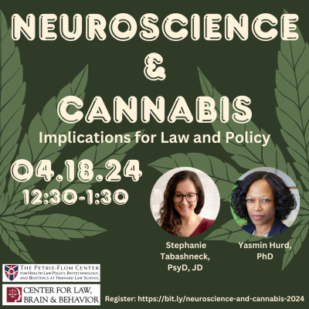
The legalization of cannabis has raised significant questions for law and public policy. In her annual lecture, neuroscientist Dr. Yasmin Hurd explored the science of cannabis, CBD, and the future of substance use disorder treatment. Dr. Stephanie Tabashneck moderated a discussion and audience Q&A about the implications for law and policy.
PANELISTS:
Yasmin Hurd, PhD, Ward-Coleman Chair, Translational Neuroscience, Professor Psychiatry and Neuroscience; Director, Addiction Institute, Icahn School of Medicine at Mount Sinai
Stephanie Tabasneck, PsyD, JD, Senior Fellow of Law and Applied Neuroscience, Center for Law Brain and Behavior at Harvard Medical School and Petrie-Flom Center; Licensed Psychologist; and Director, CLBB NeuroLaw Library
- Category: Events, Uncategorized
- Date: March 29, 2024
- Author: The Center for Law, Brain & Behavior
New Ideas for Substance Use Condition Treatment: Could Psychedelics Help?
March 19, 2024, 12:30 PM
Watch the recording here.
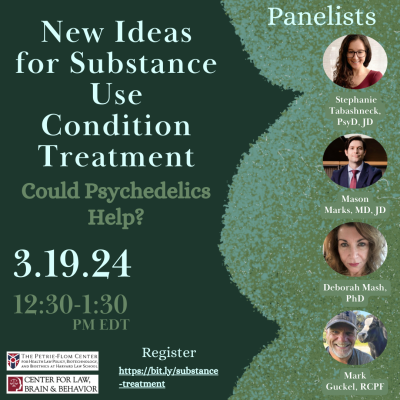
This event provided an overview of psychedelic treatments, including ibogaine and psilocybin, for substance use conditions. During this panel discussion, an ibogaine researcher, a certified recovery coach with lived experience, and a drug law expert discussed existing research, potential benefits and risks, ongoing policy and legal reforms, and societal implications.
PANELISTS:
Moderator: Stephanie Tabashneck, PsyD, JD, Senior Fellow of Law and Applied Neuroscience, Center for Law Brain and Behavior at Harvard Medical School and Petrie-Flom Center; Licensed Psychologist; and Director, Brain InCite Neurolaw Library
Deborah Mash, Professor of Neurology and Molecular and Cellular Pharmacology, Leonard M. Miller School of Medicine; Director, Brain Endowment Bank at the University of Miami; and Chief Executive Officer and Founder, DemeRx
Mark Guckel, CCAR Recovery Coach Professional, EntheoRecovery Solutions, LLC
Mason Marks, MD, JD, Visiting Professor of Law, Harvard Law School; Senior Fellow and Project Lead of the Project on Psychedelics Law and Regulation (POPLAR) at the Petrie-Flom Center; and Florida Bar Health Law Section Professor, Florida State University College of Law
- Category: Events
- Date: February 23, 2024
- Author: The Center for Law, Brain & Behavior



